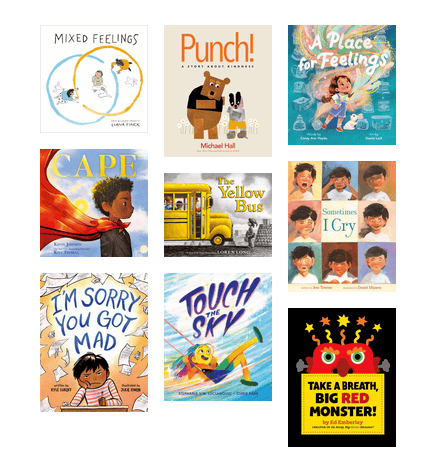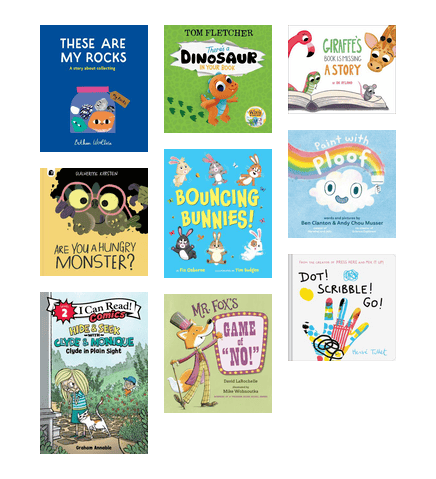5 Practices of Early Literacy
Narrate events and ideas in your everyday life. This helps your child learn new vocabulary and to use words they know.
- Ages 0-1: Talk to your baby all the time, even if they can’t respond quite yet. Narrate your day. The more words your baby hears, the larger their vocabulary will grow.
- Ages 1-2: Encourage repetitive play. Your baby may want to spend 30 minutes moving blocks from one bin to another. They are learning about concepts like gravity and motion - encourage them to repeat these simple tasks over and over.
- Ages 2-3: Introduce new vocabulary while you play. Narrate what you are doing. Use the big words and the small words—as many words as you can.
- Ages 3-5: Encourage your preschooler to tell you a story. Try retelling a familiar book, what you did today, or make up a story together. This helps to build a skill called sequencing.
Travel with Kids | Spring Break (Digital Collection)
Pack the snacks, adventure awaits! Find titles that make traveling with kids or just chilling at home extra fun on Hoopla.
All About Chick Hatching (Ages 4-11)
Mar 12th | 6:00pm - 7:00pm
Learn about how incubating eggs hatch into fuzzy chicks. Then, stop by the kids area to watch a live hatch (available through March 31).
Anything But a Paintbrush (Ages 2-7)
May 7th | 4:30pm - 5:30pm
Make art with anything but a paintbrush, then take it home to enjoy! Alternative tools may include sponges, straws, toy cars, and…
Baby Clothing Swap: Free Shopping Day
May 9th | 2:00pm - 5:00pm
Looking for something new for your baby's wardrobe? Check out the selection of new and gently used clothing items.
Travel with Kids | Spring Break (Digital Collection)
Pack the snacks, adventure awaits! Find titles that make traveling with kids or just chilling at home extra fun on Hoopla.
All About Chick Hatching (Ages 4-11)
Mar 12th | 6:00pm - 7:00pm
Learn about how incubating eggs hatch into fuzzy chicks. Then, stop by the kids area to watch a live hatch (available through March 31).
Anything But a Paintbrush (Ages 2-7)
May 7th | 4:30pm - 5:30pm
Make art with anything but a paintbrush, then take it home to enjoy! Alternative tools may include sponges, straws, toy cars, and…
Baby Clothing Swap: Free Shopping Day
May 9th | 2:00pm - 5:00pm
Looking for something new for your baby's wardrobe? Check out the selection of new and gently used clothing items.
Reading Challenge
1,000 Books Before Kindergarten
Unlock your child's potential with this reading challenge. For ages 0-5.
Suggested Websites
Social Emotional Learning Picture Books
Books connected to social-emotional learning or skills such as managing emotions, building relationships, and making responsible decisions.
Interactive: For Ages 3-6
Enjoy a fun-filled read with these picture books where you help tell the story by touching the pages, talking to the characters, and more!
Kids love to cook.
Talk about recipes and have fun writing and/or drawing your own recipes together.
Tell me a story.
Ask you child to tell you a story. Why? This helps develop imagination and vocabulary.
Social Emotional Learning Picture Books
Books connected to social-emotional learning or skills such as managing emotions, building relationships, and making responsible decisions.
Interactive: For Ages 3-6
Enjoy a fun-filled read with these picture books where you help tell the story by touching the pages, talking to the characters, and more!
Kids love to cook.
Talk about recipes and have fun writing and/or drawing your own recipes together.
Tell me a story.
Ask you child to tell you a story. Why? This helps develop imagination and vocabulary.
Kristen C.
When she’s not working with kids here at the library, you might find her on the bike trail or baking up a sweet treat.
Ashleigh M.
Ashleigh loves to see people grow and become their best selves here at the library.
Annamarie C
Annamarie loves all things Disney! When she's not planning her next storytime, she's likely traveling or volunteering at the Columbus Zoo.
Katie R.
Katie knows all of the tricks to start your baby on the path to lifelong reading.
Kristen C.
When she’s not working with kids here at the library, you might find her on the bike trail or baking up a sweet treat.
Ashleigh M.
Ashleigh loves to see people grow and become their best selves here at the library.
Annamarie C
Annamarie loves all things Disney! When she's not planning her next storytime, she's likely traveling or volunteering at the Columbus Zoo.
Katie R.
Katie knows all of the tricks to start your baby on the path to lifelong reading.

















